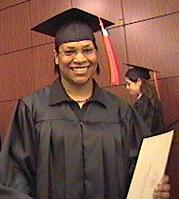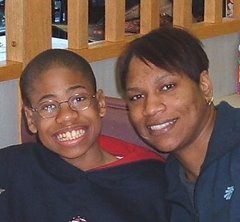From The Disability Policy Collaboration
The Arc of the United States and United Cerebral Palsy need your compelling, real-life stories of employment discrimination on the basis of disability to help make the case to Congress that the Supreme Court's narrow interpretations of the Americans with Disabilities Act have harmed people with disabilities in employment. It is time to restore the original scope and intent of the ADA!
Click here for more details about this issue and how to send your personal story.
The Arc and UCP, together with the Consortium for Citizens with Disabilities (CCD), will use these personal stories in coming weeks to educate members of Congress about the need for a legislative "fix" to the ADA in a way they can relate to and that can be readily understood. child-autism-parent-cafe.com
Tuesday, January 30, 2007
A failure in autism treatment
The New Jersey Center for Outreach and Services for the Autism Community released a white paper last month with more than 80 recommendations for revamping a system that largely ignores adults who suffer from the neuro-developmental disorder. The group, which provides autism education and advocacy services, called for an "integrated, seamless" service delivery system that's available to everyone and proactive strategies to meet the needs of an increasing number of adults with autism. child-autism-parent-cafe.com
Click here for info
Click here for info
Monday, January 29, 2007
Punished, sidelined, betrayed - our lost generation of autistic children
SCOTLAND'S education system is failing hundreds of the country's most vulnerable youngsters, bringing misery to families, an investigation by The Scotsman has revealed. Our investigation uncovered disturbing evidence of how schools often refuse to accept that a child's behaviour could be linked to autism, despite the large rise in diagnosed cases. Even when a child is diagnosed, staff are often simply unable to cope with the challenges their autism presents. Instead, the pupils can be labelled disruptive, meaning the school looks to punish the child rather than help them to cope with the effects of their condition. child-autism-parent-cafe.com
Click here for info
Click here for info
Wednesday, January 17, 2007
Mini DAN! Conference on Jan. 27-28, 2007
There is an upcoming mini DAN! Conference to be held later this month, January
27 and 28, in Jacksonville, Florida. Maureen McDonnell, R.N., Drs. Elizabeth Mumper, Nancy O’Hara, Jerry Kartzinel, and Julie Buckley will provide parents and clinicians with practical information on current research, relevant tests and effective approaches for treating autistic children. Parents are encouraged to attend this session on January 27.
On January 28, licensed health care providers are invited to attend a
full-day intensive training. During this session the DAN! faculty will share their
knowledge and experience regarding how to identify subgroups within the
autism population, prioritize treatments, select appropriate testing, and
interpret lab data. Additionally, information on treating common features
such as intestinal dysbiosis, nutritional imbalances, immune dysregulation,
inefficient detoxification and heavy metal toxicity will be reviewed. child-autism-parent-cafe.com
Click here for more info
27 and 28, in Jacksonville, Florida. Maureen McDonnell, R.N., Drs. Elizabeth Mumper, Nancy O’Hara, Jerry Kartzinel, and Julie Buckley will provide parents and clinicians with practical information on current research, relevant tests and effective approaches for treating autistic children. Parents are encouraged to attend this session on January 27.
On January 28, licensed health care providers are invited to attend a
full-day intensive training. During this session the DAN! faculty will share their
knowledge and experience regarding how to identify subgroups within the
autism population, prioritize treatments, select appropriate testing, and
interpret lab data. Additionally, information on treating common features
such as intestinal dysbiosis, nutritional imbalances, immune dysregulation,
inefficient detoxification and heavy metal toxicity will be reviewed. child-autism-parent-cafe.com
Click here for more info
Thursday, January 04, 2007
IDEA Sample State Complaint Form
This complaint form provides a document to submit a complaint to the New York State Education Department (NYSED). This form can be used when parents, individuals or organizations believe a school district or public agency has violated a requirement of Part B of IDEA or NYS laws or regulations related to students with disabilities. Use of this form is not required. If you choose not to use this form, you must include in your complaint the required information that is identified on this form. For more information contact the Office of Vocational and Educational Services for Individuals with Disabilities (VESID), Special Education Policy Unit at 518-473-2878. child-autism-parent-cafe.com
Click here for info
Click here for info
Tuesday, January 02, 2007
Emotion detection may explain autism
University of Wisconsin-Madison researchers have documented changes in the brain's emotional center that may explain the social impairment seen in children with autism. The UW authors found that males with autism who spent the least time looking at a person's eyes in photographs had a much smaller amygdala - the almond-shaped danger-detecting region of the brain - than males without autism. Males with a small amygdala also had difficulty distinguishing any face showing an emotion from those with neutral expressions, researchers say.
And in a separate French study, scientists identified a gene that may explain why some people develop autism. child-autism-parent-cafe.com
Click here for info
And in a separate French study, scientists identified a gene that may explain why some people develop autism. child-autism-parent-cafe.com
Click here for info
Subscribe to:
Posts (Atom)


